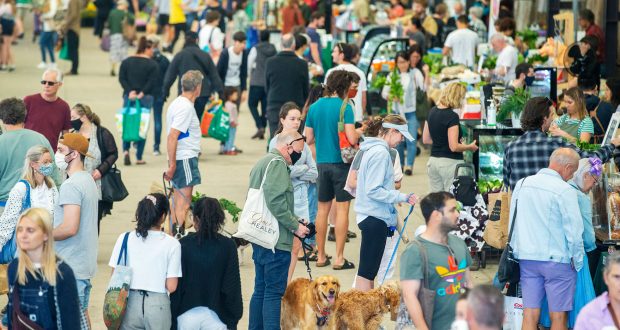Cloth masks must be washed at high temperatures after use in order to provide protection against the transmission of COVID-19, say researchers at UNSW.
The research – an analysis of unpublished data from a randomised controlled trial the researchers published in 2015 – found that handwashing cloth masks did not provide adequate protection and that healthcare workers who did so had double the risk of infection.
“Both cloth masks and surgical masks should be considered ‘contaminated’ after use,” said Professor Raina MacIntyre, who conducted the study. “Unlike surgical masks, which are disposed of after use, cloth masks are re-used. While it can be tempting to use the same mask for multiple days in a row, or to give it a quick hand-wash or wipe-over, our research suggests that this increases the risk of contamination.”
As the study was conducted five years ago, testing mask effectiveness against SARS-Cov-2 was not possible, but researchers tested common respiratory pathogens such as influenza, rhinoviruses and seasonal coronaviruses in their analysis.
“Given the potential implications for health workers or community members who are using cloth masks during the pandemic, we did a deep dive into the 2011 data on whether the health workers in our study washed their masks daily, and if so, how they washed their masks. We found that if cloth masks were washed in the hospital laundry, they were as effective as a surgical mask,” said MacIntyre.
“While someone from the general public wearing a cloth mask is unlikely to come into contact with the same amount of pathogens as a healthcare worker in a high risk ward, we would still recommended daily washing of cloth masks in the community. COVID-19 is a highly infectious virus, and there is still a lot that we don’t know about it, so it’s important that we take every precaution we can to protect against it and ensure masks are effective.”
Mask malaise
Mask use across NSW has dropped, according to the government, and there are fears that complacency is starting to set in.
Wendy Waller, mayor of Liverpool, where there have been several cases over the past weeks, is worried that her constituents are tired of COVID-19 restrictions and this has led the decline.
"Yesterday when I did my shopping locally I was the only one wearing a mask, yet a month ago everybody was wearing a mask," Waller told her local paper Today, as reported by the Sydney Morning Herald.
"So I think we have to be careful, even though it's frustrating ... this is a very contagious disease and we have to continue to be preventative in what we're doing."
There have been renewed calls in the state for mandatory mask wearing on public transport as cases creep back up and testing numbers remain low.
Monitoring of the mask levels at Sydney public transport hubs suggests that mask use is only at 30 per cent. Public transport minister Andrew Constance has warned that NSW could head for a Melbourne-style lockdown if people insist on ignoring public health advice.
"We ask everybody using public transport to wear a mask, in addition to practising good personal hygiene, physical distancing and not travelling if you’re feeling unwell.”
Professor MacIntyre, writing in the SMH, implored the government to consider making masks mandatory if the relaxation of any distancing measures in public indoor venues goes ahead.
“SARS-COV-2 is spread by respiratory aerosols, mostly in close contact, but in indoor venues these aerosols can accumulate over time,” she wrote.
"Think of cigarette smoke accumulating in a closed venue – it’s the same, but you cannot see these human emissions. Simply breathing or speaking generates aerosols that cannot be seen by the naked eye, and in the absence of good ventilation, these accumulate like clouds inside closed venues. The net aerosol generation from breathing and speaking is much greater than coughs or sneezes, because the breathing and speaking occur constantly, whereas coughs and sneezes are occasional. Someone visibly sick in a venue may be asked to leave, but many people can be infectious and look well.”
COVID may last on surfaces longer than first thought
New CSIRO research has found that Sars-CoV-2 can survive up to 28 days on mobile phones and ATM screens.
The research also found that the virus survived longer on smooth surfaces than rough and lasted longer on paper banknotes than plastic. Temperature was also found to affect the virus, with the virus lasting for 28 days at 20 degrees, while the survival times decreased at higher temperatures.
The same experiments conducted with influenza A found that it survived on surfaces for 17 days.
Do you have an idea for a story?Email [email protected]
 Aged Care Insite Australia's number one aged care news source
Aged Care Insite Australia's number one aged care news source

